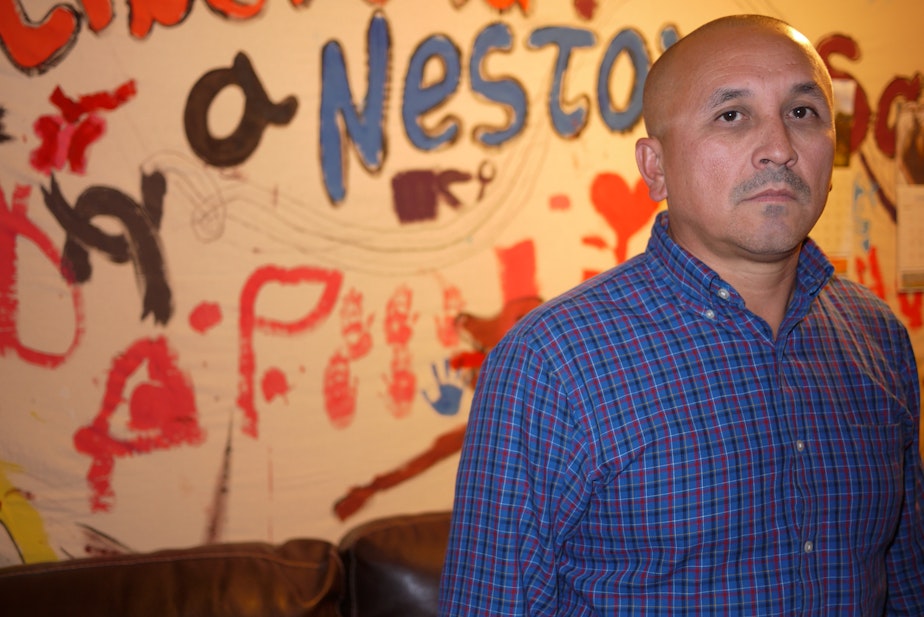Renton Grandmother in Mexican Prison: ‘I Need Help’

Human rights activist Nestora Salgado raised her family in Renton. She’s a U.S. citizen and a human rights activist.
But most people know her now as a political prisoner. She’s been held in a Mexican prison for more than two years, with limited outside contact.
Recently, Salgado was transferred to a lower security facility, and allowed more visitors and phone calls.
KUOW’s Liz Jones met up with Salgado’s husband for an update on her case.
TRANSCRIPT
Sponsored
Nestora Salgado’s husband, José Luis Avila, lives at a sprawling apartment complex in Renton.
Mexican music drifts through the parking lot, from a passing car and a nearby balcony.
I walk up to Avilas’s third-floor apartment to the home he shared with Salgado until her arrest.
We’ve arranged for a phone call with a freelance reporter in Mexico – one of the only reporters able to visit Salgado.
As we wait, Avila shows me some laminated 8-by-10 photos of his wife – and a community police force she helped lead in Mexico.
Sponsored
Avila: “So this is the police that she formed in Olinalá.”
Liz Jones: “That’s a lot of people.”
Avila: “The whole community, it really come together after suffering for months the violence, the kidnapping, the extortion, the murder you know.”
This photo shows Salgado leading a crowd of people in her home village, in the Mexican state of Guerrero.
Salgado, 43, made frequent trips there and gradually started this uprising against a plague of organized crime and violence she witnessed.
Sponsored
Avila: “We are facing a monster in Mexico. With all this corruption.”
Guerrero state law allows indigenous groups to create police forces. But there’s strong debate about exactly what they're authorized to do and how they operate.
Salgado’s group made arrests, and detained people.
Some accuse of her of going too far and want her to face trial. Her charges range from kidnapping to murder. Charges her attorneys say are fictitious, yet common to see against activists.
The phone rings. It’s time for the call. We gather around a speakerphone. On the other end is reporter Alysa Hullett, in an echo-y conference room in Mexico City. She’s just visited Salgado the day before.
Sponsored
Alysa Hullett: “And she just came up and gave me a big hug, and the Mexican greeting – a kiss. Yeah, she was really welcoming and was joking with the front desk man who was helping me sign in.”
Liz Jones: “Jose Avila, does that sound like the Nestora that you know and remember?”
Jose Avila: “Yes, it’s amazing for me that after 26 months for me living in this horrible condition, that still this is the Nestora that I know.”
Liz Jones: “And what did she tell you about the conditions of the prison?”
Alysa Hullett: “Well, it’s much better than the high security prison she was at before but she described it as cruel still. And I asked her about specific details and she declined to provide any because she said she’s afraid of being reprimanded.”
Sponsored
We talk about Salgado’s health. A car crash years ago left her with severe nerve damage. Without physical therapy, and her hands now barely move. José Avila stares at the phone, shaking his head. He says his wife has been singled out for extra harsh treatment.
Jose Avila: “It makes me feel so angry, because even though that right now she’s in their custody, we have to buy her own medicine right now. So basically right now we are spending over $1,000 a month because we have to bring in some medication for her, even we had to bring some food. We had to buy even the toilet paper. We have to do everything for her. We have to wash her own clothes. We have to do everything.
"And we are demanding her release because she is an innocent person that has been in this horrible condition for the past 26 months."
Liz Jones: “Alysa, did Nestora have any messages that she wanted you to share with her family or with Jose Avila?”
Alysa Hullett: “She just wanted to reiterate her gratitude for everything her family has done. She told me she is very worried about their safety.”
Salgado also gave her a message to share with the public.
Alysa Hullett (reading a quote from Salgado): “I’m tired of fighting against the government. I’m fighting against someone very powerful. I’m a little pessimistic because I’m not powerful enough to do it on my own. I need more support from the rest of the world. I can’t do it on my own.”
After the call, José Avila pulls up this video of Salgado.
She’s giving a press conference in her hometown of Olinalá, just days before her arrest.
She’s saying, “Day after day, people turn up dead. People disappear. We have to stay committed to protect ourselves.”
Avila: “This is life in Mexico. It’s really painful.”
Salgado’s attorneys say she was illegally detained, without a warrant. She’s never had a day in court.
They want the U.S. State Department to step in.
José: “If I lose hope, I’m dead. I’m gonna fight. I’m gonna fight. I don’t care if it takes my whole life. I’m going to do every that I can to make sure that she gets released.”
In the meantime, Salgado’s legal team at Seattle University continues to work with the Inter-American Commission on Human Rights. They say meetings with Mexican officials recently intensified, raising new hope that a breakthrough is near.
This story was co-reported with the Seattle Globalist. You can read their version of this story here.

